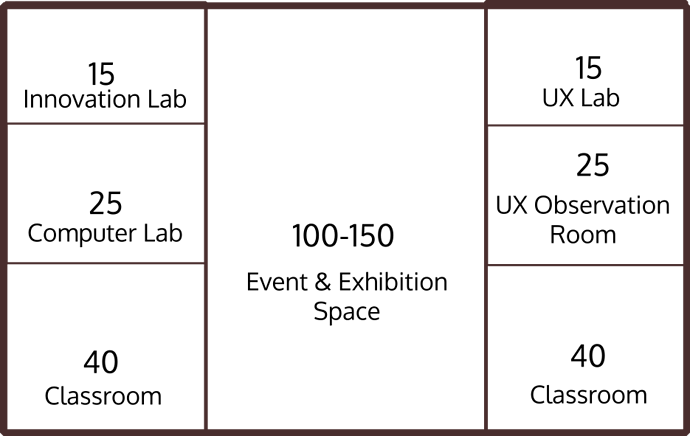#The Opportunity
A Peer-To-Peer (P2P) education hub creates a bigger, higher-quality startup pipeline and supports non-high-growth startups based on local tech strengths. It uses both tried-and-tested, and some of the most innovative education formats to create and enable technology companies from idea to growth stages.
We are considering hosting this in the UK, Netherlands or in SE Europe. This overview focuses on SE Europe.
#Common Goal - How will it make a difference?
This will give support on a meritocratic basis, to as many tech startups that warrant support, not just the ones who are selected for specific programmes. It will do this by leading with local strengths, like B2B products and tech service firms, creating the host city (Sofia, Belgrade or Bucharest?) as the known capital in these areas.
#Organisational Goals:
Start It Smart wants to cement its position as a foundational startup support organisation, and establish ongoing programmes and a sustainable business model.
LAUNCHub and Eleven are moving into later-stage investment and support, and need an early-stage pipeline.
Accelerators are opening in Romania and Serbia. This will provide a leg-up towards higher-tier and more responsive, relevant support. It’ll also give the accelerators access to an instant mentoring network that’s run with state-of-the-art techniques.
Montenegro and Macedonian startup communities will have an quivalent level of startup support and education as accelerators. Their geographically diverse (and isolated) startups will be actively included through the online aspects of the community.
EIF is investing to see sustainable startup support as their legacy.
MoveBG is interested in gathering data and insight on what are some innovative SMEs and what are their problems in order to drive strategic support in the industry. Similar to how the Erasmus consortium would benefit from using P2P summits for rapidly evolving it’s curriculum.
Source Institute wants to progress startup support to be broader and farther reaching than through the standard accelerator model. We want to progress with lessons learned from the first phase of the accelerator industry.
Peer -to-peer (P2P) education is the focus of Source Institute. We’re invested in developing P2P from a small set of tested methods to a broad toollkit creating impact worldwide.
To do this, we invest in R&D and demonstrate value with proofs-of-concept. We’d like to support, or lead, an physical space that facilitates this. This space will become the global leader in P2P. In the same way that Lean Startup took hold in San Francisco and London first, we expect similar benefits to accrue to the host city of the P2P Hub.
Strategic Relevance
As Sofia’s startup community matures and specialises, early-stage support needs to scale and diversify to keep up. Early-stage pipeline needs to widen. Accelerators have provided investment, education and community support so far. By tackling early-stage support and education (at a scale not limited by selecting startups for investment), the P2P Hub offers the flexibility, responsiveness and scalability that’s required for the regions’s startup community to grow to the next level. It allows us to education and support more early-stage tech businesses, regardless of if they’re seeking investment at the moment. This develops a larger and more diverse pipeline.
Resources
Budget: 50,000 - 450,000 EUR over 3 years, depending on partners’ in-kind contributions
Timeline: 3 years
People needed:
Managing Director
3 X Programme Designer (p/t)
UX Lab Director (p/t)
Product Innovation Lab Director (p/t)
Experiment Lab Director (p/t)
Events Manager
Marketing Manager
Office Manager
Writer
Video Editor (p/t)
Visual Designer (pt)
Resources needed:
Multi-classroom space.
Larger event space.
Computer Lab
UX Lab
Outcomes:
- +10 Super-Seed or Post-Seed investments per year
- +200 knowledge worker positions created per year
- 10 startup seed investments per year
- +1 agency into international expansion per year
- 3 e-books per year
- 100 online lessons per year
Description
The P2P Hub will provide many functions of accelerators, but at a larger scale:
- Startup education
- Mentoring
- Creating focal points for the international startup community in Sofia
- Creating gathering points for the local technology community in Sofia
- Providing a forum to express and address issues in the startup and technology industry
It will do so through ongoing peer-to-peer events, both large and small scale:
- Unconferences address the most relevant, practical challenges faced by various local disciplines and industries. Each enables these communities to teach each other and bubble up unspotted leaders in the topics that truly matter. These summits will run quarterly, attracting the most active and viable startups in the region.
- Online Education built from interviews of successful local founders and role models. Entreprenurs get the most relevant advice as they need it, delivered via a platform the reinforces Sofia’s strengths.
- Content, such as e-books, written from local experiences and role models.
- Experiential Workshops convey with why through simulations, spreading attitude shift from Sofia and Europe’s leading personalities, then layer on the how, the most relevant practical skills. These workshops will be designed by Source and delivered by Source and Start IT Smart.
- Peer-support programmes, like mentoring, peer-advisory, office hours, meetups.

